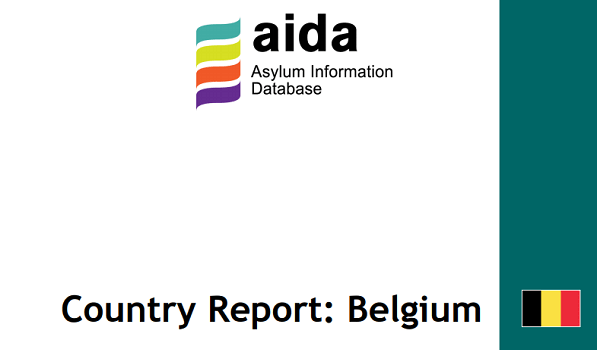The updated AIDA Country Report on Belgium tracks recent developments in the area of asylum procedures, reception conditions, detention of asylum seekers and content of international protection in 2020.
In 2020, the number of applicants (16,910) for international protection decreased by 39% compared to 2019. This is the lowest number of applicants for international protection since 2008, and is mainly due to the impact of the covid-19 crisis. Between March and July 2020 there was a significant drop in the number of applicants for international protection, but since August the number began to rise again. In 2020, 34,1% of the final decisions were positive, granting international protection. Protection was mainly granted to Syrians, Afghans, Turks, Somalis and Eritreans. The recognition rate has steadily decreased since 2016, mainly due to the increase of inadmissibility decisions and the number of subsequent applications as well as applications from persons with protection status in another Member State. When excluding these cases, the recognition rate was 47,3% in 2020.
On 17 March 2020, at the start of the covid-19 pandemic the Immigration Office decided to close its doors to the public, and thus suspended access to the asylum procedure. On 3 April 2020 the Immigration Office re-opened with a new system for the registration of applicants for international protection. Applicants wanting to make their application had to fill in an online registration form, after which they were invited on a later date to officially make and lodge their application for international protection. Because of these measures – between March and October 2020 – a significant number of applicants for international protection had no access to the reception system. According to the law applicants for international protection are only entitled to material aid from the moment they make their application for international protection. Since applicants had to wait – some for several weeks – before they were able to make their application for international protection, they had no access to the reception system during this waiting period. A coalition of civil society organisations decided to declare the Belgian state in default at the Brussels court of first instance. On 5 October 2020 the court condemned the Belgian state, after which the Immigration Office returned to the previous system of physical registrations on 3 November 2020. Applicants have since then regained immediate access to reception conditions as well.
In the light of the covid-19 sanitary measures, the CGRS announced in November 2020 that, in certain cases, it would conduct interviews with people residing in open reception centres through videoconference. The aim was to introduce interviews by videoconference on a structural level. However, civil society organisations instituted an urgency procedure before the Council of State against this decision, arguing the CGRS had no legal competence to take this decision. In a judgment of 7 December 2020, the Council of State suspended the decision, ruling that the CGRS had indeed overstepped its competences. Any adaptations of the conditions of the personal interview ought to be taken by Royal decree or law. In one later judgment, the CALL extended the ruling of the Council of State to the longstanding practice of interviews through videoconference for people residing in closed detention centres given that, here too, that practice was based solely on a CGRS decision. The CGRS now expressed its intention to recommend the Secretary of State to take legal initiative to ground interviews through videoconference in the Royal Decree.
In February 2020 the Immigration Office also started a new practice with regards to the organisation of the voluntary return procedure for applicants who had received a negative Dublin transfer decision with order to leave the territory (annex 26quater). Upon receiving this decision, applicants had to fill in a ‘voluntary return form’, confirming they would cooperate with their transfer to the responsible member state, and send this back to the Immigration Office within ten days. If they failed to do so, the transfer deadline would be extended from 6 to 18 months. In July 2020 the CALL ruled this practice to be in conflict with the CJUE Jawo judgement and its definition of the term ‘absconded’. Based on this judgement, the Immigration Office ended this practice altogether in July 2020.
Due to the critical reception capacity at the beginning of 2020, policy measures were adopted to withdraw reception conditions of certain asylum applicants. Through instructions of 3 January 2020, Fedasil limited the material reception to medical assistance to applicants for international protection who have received a transfer decision on the basis of the Dublin III Regulation, but for whom Belgium becomes responsible by default due to failure to transfer within the six months deadlines; and for applicants for international protection who make a first application in Belgium but who already have an international protection status in another EU Member State. Several NGOs introduced an appeal with the Council of State aiming for the suspension and the annulment of the Fedasil instructions. In September 2020, just prior to the hearing before the Council of State, Fedasil withdrew the instructions of 3 January 2020. Both categories of asylum seekers have thus since regained their full right to material assistance, including reception, during their asylum procedure.
Photo: ECRE
This article appeared in the ECRE Weekly Bulletin. You can subscribe to the Weekly Bulletin here.

